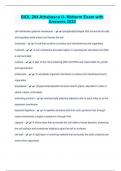Chromoplast - Study guides, Class notes & Summaries
Looking for the best study guides, study notes and summaries about Chromoplast? On this page you'll find 26 study documents about Chromoplast.
All 26 results
Sort by
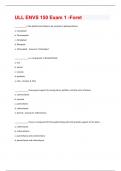
-
ULL ENVS 150 Exam 1 -Foret Updated 2024/2025 with complete solutions
- Exam (elaborations) • 24 pages • 2024
- Available in package deal
-
 ACADEMICMATERIALS
ACADEMICMATERIALS
-
- $7.99
- + learn more
__________ is the plastid most likely to be involved in photosynthesis. a. Leucoplast b. Chromoplast c. Amyloplast d. Riboplast e. Chloroplast - Answer-E. Chloroplast ____________ is a crop grown in flooded fields. a. rice b. wheat c. cassava d. potatoes e. oats - Answer-A. Rice ____________ tissue gives support to young stems, petioles, and the veins of leaves. a. sclerenchyma b. vascular c. parenchyma d. collenchyma e. dermal - Answer-D. Collenchyma ____________ tissue is com...
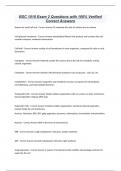
-
BSC 1010 Exam 2 Questions with 100% Verified Correct Answers
- Exam (elaborations) • 8 pages • 2024
- Available in package deal
-
 Winfred
Winfred
-
- $10.99
- + learn more
BSC 1010 Exam 2 Questions with 100% Verified Correct Answers Reason for small cell size - Correct Answer To maximize the ratio of surface area to volume cell (plasma) membrane - Correct Answer phospholipid bilayer that protects and encloses the cell; controls transport; maintains homeostasis Cell Wall - Correct Answer outside of cell membrane in some organisms, composed of carbs or carb derivatives Cytoplasm - Correct Answer Material outside the nucleus that is the site for metabolic a...

-
BOT 2100 Exam Questions with 100% Correct Answers.
- Exam (elaborations) • 4 pages • 2024
- Available in package deal
-
 ROSEGRADES
ROSEGRADES
-
- $11.99
- + learn more
BOT 2100 Exam Questions with 100% Correct Answers. Fungi are more closely related to.... - CORRECT ANSWER animals than plants Hyphae - CORRECT ANSWER filamentous strands that secrete exoenzymes Mass of hyphae is called - CORRECT ANSWER Mycelium Coenocytic - CORRECT ANSWER Hyphae lacking septa Haustoria - CORRECT ANSWER a projection of fungal hyphae that functions as a penetrating and absorbing organ. The three major types of organisms on early earth - CORRECT ANSWER bacte...
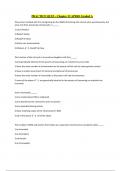
-
PRACTICE QUIZ - Chapter 12 APBIO Graded A
- Exam (elaborations) • 11 pages • 2024
- Available in package deal
-
 CertifiedGrades
CertifiedGrades
-
- $9.99
- + learn more
PRACTICE QUIZ - Chapter 12 APBIO Graded A The person credited with first recognizing (in the 1860s) that living cells cannot arise spontaneously, but arise only from previously existing cells, is _____. 1) Louis Pasteur 2) Robert Hooke 3) Rudolf Virchow 4) Anton van Leeuwenhoek 5) Watson ️3. Rudolf Virchow The function of the cell cycle is to produce daughter cells that _____. 1) are genetically identical to the parent cell (assuming no mutation has occurred) 2) have the sa...
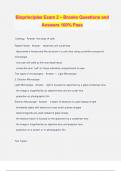
-
Bioprinciples Exam 2 – Brooks Questions and Answers 100% Pass
- Exam (elaborations) • 42 pages • 2024
- Available in package deal
-
 BrittieDonald
BrittieDonald
-
- $13.49
- + learn more
Bioprinciples Exam 2 – Brooks Questions and Answers 100% Pass Cytology - Answer- the study of cells Robert Hooke - Answer- - observed cork could float - discovered a honeycomb-like structure in a cork slice using a primitive compound microscope - only saw cell walls as this was dead tissue - coined the term "cell" for these individual compartments he saw Two types of microscopes: - Answer- 1. Light Microscope 2. Electron Microscope Light Microscope - Answer- - light is focused on s...
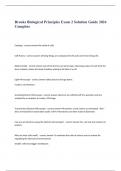
-
Brooks Biological Principles Exam 2 Solution Guide 2024 Complete
- Exam (elaborations) • 26 pages • 2024
- Available in package deal
-
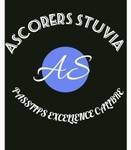 Ascorers
Ascorers
-
- $11.99
- + learn more
Cytology - correct answer-the study of cells Cell Theory - correct answer-all living things are composed of cells and come from living cells Robert Hooke - correct answer-one of the first to use microscope, observing a piece of cork from the stem of plants, where he found chambers arising in the idea of a cell. Light Microscope - correct answer-takes pictures of large atoms. nucleus, not electrons Scanning Electron Microscope - correct answer-electrons are reflected off of a specime...

-
Honors Biology 10th grade Exam Review Study Guide
- Exam (elaborations) • 10 pages • 2024
- Available in package deal
-
 SophiaBennett
SophiaBennett
-
- $9.99
- + learn more
Honors Biology 10th grade Exam Review Study Guide mitochondria - Answer️️ -the "powerhouse" of the cell, which transforms sugar into useful energy is called cytoskeleton - Answer️️ -the system that helps the cell to maintain its shape and structural integrity is organ system - Answer️️ -a group of organs that work together to complete the life function is called pinocytosis - Answer️️ -the movement of bulk fluids across the cell membrane is called active transport - An...
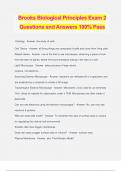
-
Brooks Biological Principles Exam 2 Questions and Answers 100% Pass
- Exam (elaborations) • 25 pages • 2024
-
 BrittieDonald
BrittieDonald
-
- $12.49
- + learn more
Brooks Biological Principles Exam 2 Questions and Answers 100% Pass Cytology - Answer- the study of cells Cell Theory - Answer- all living things are composed of cells and come from living cells Robert Hooke - Answer- one of the first to use microscope, observing a piece of cork from the stem of plants, where he found chambers arising in the idea of a cell. Light Microscope - Answer- takes pictures of large atoms. nucleus, not electrons Scanning Electron Microscope - Answer- electrons ar...
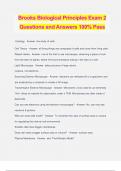
-
Brooks Biological Principles Exam 2 Questions and Answers 100% Pass
- Exam (elaborations) • 25 pages • 2024
-
 GraceAmelia
GraceAmelia
-
- $12.49
- + learn more
Brooks Biological Principles Exam 2 Questions and Answers 100% Pass Cytology - Answer- the study of cells Cell Theory - Answer- all living things are composed of cells and come from living cells Robert Hooke - Answer- one of the first to use microscope, observing a piece of cork from the stem of plants, where he found chambers arising in the idea of a cell. Light Microscope - Answer- takes pictures of large atoms. nucleus, not electrons Scanning Electron Microscope - Answer- electrons ar...

How did he do that? By selling his study resources on Stuvia. Try it yourself! Discover all about earning on Stuvia

